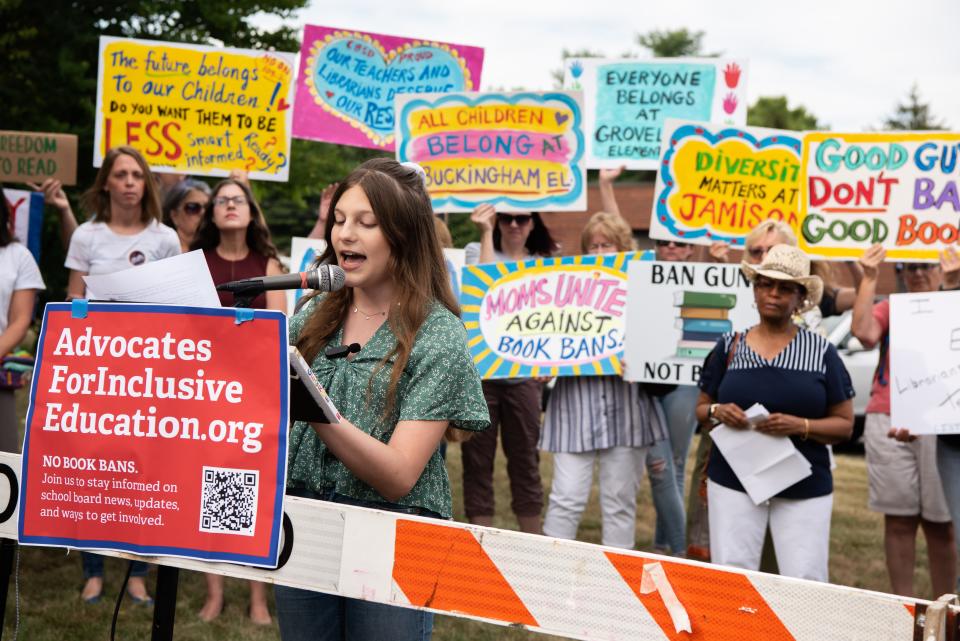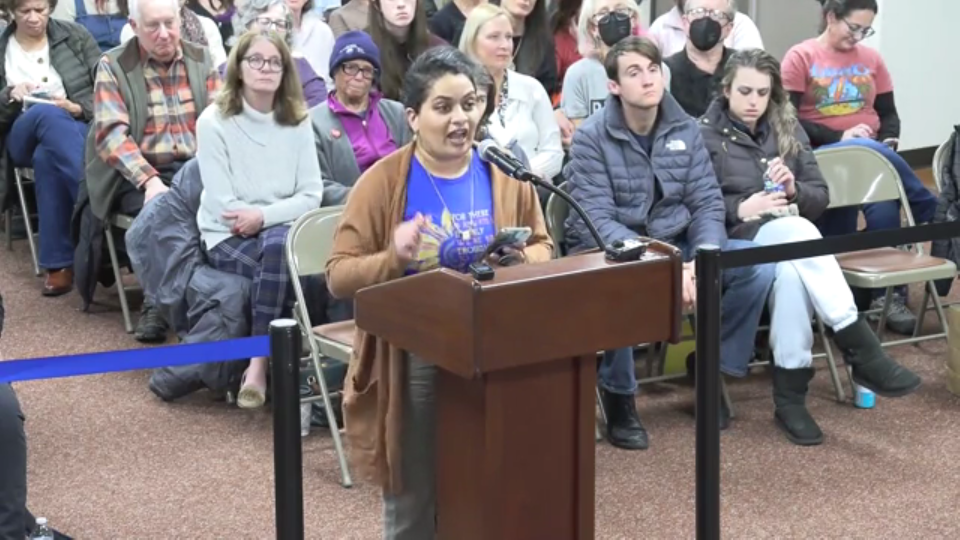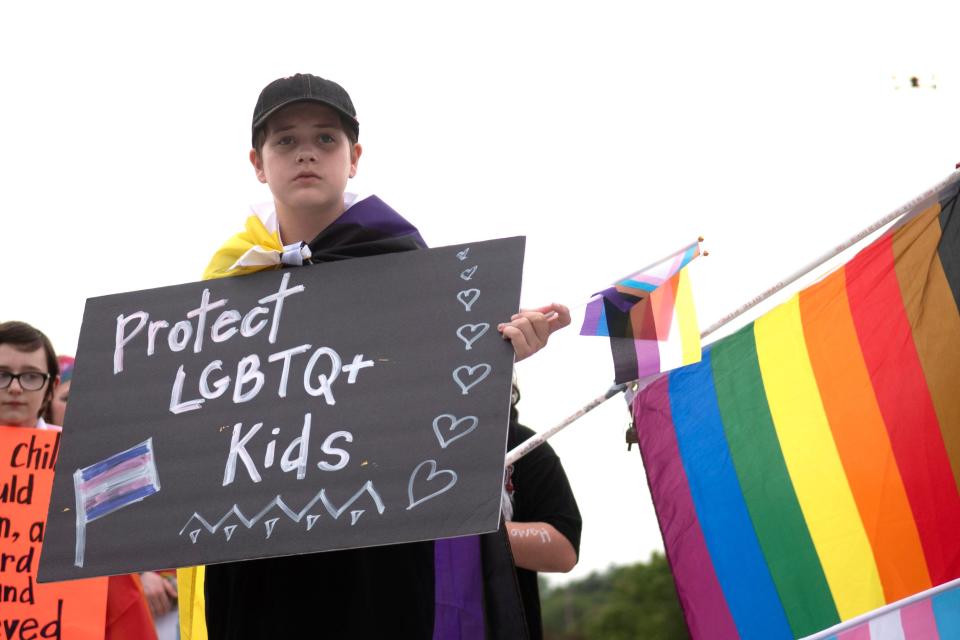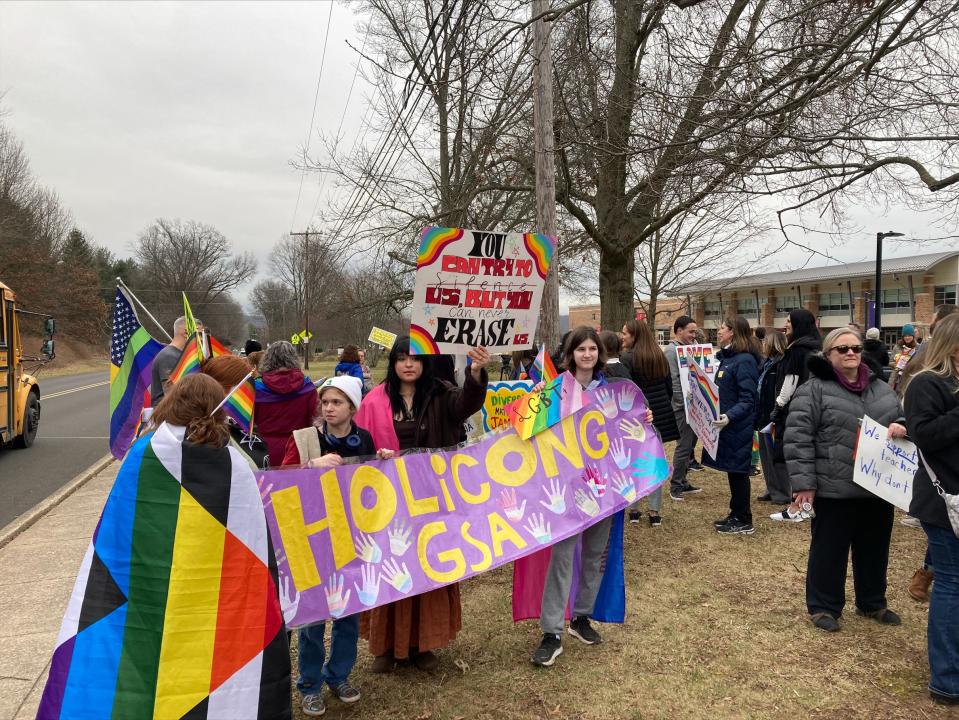Only a handful of Pa. school districts have policies protecting trans students
Bathroom bans and other provisions targeting transgender students have cropped up in a number of Pennsylvania school districts in recent years, part of a wave of state and local laws to restrict everything from trans health care to participation in sports.
But a handful of school districts in the commonwealth have moved in the opposite direction, making official commitments to recognize and safeguard students’ rights to assert their gender identities.
At least 30 school districts in Pennsylvania have embraced protections for transgender students, often through policies that touch on names and pronouns, confidentiality, athletics and access to private spaces such as locker rooms and bathrooms, according to an analysis by the USA TODAY Network.
Generally, these policies have surfaced over the past seven years in the collar counties around Philadelphia and near other Pennsylvania cities.
Brian Dittmeier, policy director at GLSEN, a national network that pushes for safe learning environments for LGBTQ youth, told the USA TODAY Network that specific policies with enumerated protections for LGTBQ youth help "build a culture of inclusion across the school community” and help both students and school staff address harassment.
These policies are also a wise legal move, said Christopher Dormer, superintendent in the Norristown Area School District.
In a time when many people view school systems with suspicion and accuse administrators of making decisions out of personal bias, it’s helpful to have a legally vetted policy for all to see, he said.
“It just puts everybody in a position of like, here is the governance and the guidelines that we all agree we’re going to live by,” said Dormer, whose district adopted its policy on transgender students in 2019.

At least four school districts in Pennsylvania have faced lawsuits over the treatment of transgender or non-binary students since 2015. And practices in Central Bucks School District have spawned multiple legal issues, with the ACLU, on behalf of seven students, accusing the district of creating a “hostile” and “toxic” environment toward LGBTQ students and pressing for a federal investigation. The Department of Education's Office of Civil Rights is investigating the ACLU complaint.
Advocates and supporters of transgender protections have also described them as a moral imperative — important for the wellness of LGBTQ students, whose risk of self-harm decreases in supportive and affirming environments.
More: These Pennsylvania school districts have enacted transgender student protection policies
Survey: Pa. residents, is your school district supportive of LGBTQ+ students?
A 2021 National School Climate Survey conducted by GLSEN found that transgender students in districts with affirming policies reported lower rates of harassment and absenteeism and were less likely to be prevented access to school facilities and activities consistent with their gender identity.
But opponents contend the policies themselves are discriminatory, infringing on the rights of parents and on the privacy of cisgender students in bathrooms and changing areas.
“You've got to preserve the rights of everyone, not just the one class of people,” said Bruce Chambers, former school board president in Chester County’s Great Valley School District.

Why are Pa. districts passing these policies?
In New Hope-Solebury School District, located in Bucks County, school directors decided to pursue a policy on transgender students several years ago following “disparaging public comments” about these young people, according to a statement released by the board.
“In response to these comments, students, families and local representatives of the LGBTQ community advocated for a school policy that would support inclusion and provide guidance for meeting the needs of transgender students,” the statement continued.
In the Norristown Area School District, which serves a diverse Montgomery County community, officials have long been on a mission to increase racial equity and inclusivity, according to Dormer.
More: Central Bucks committee: Policy, not pornography, led to removing two LGBTQ-themed books
Several years ago, they realized they needed to broaden these efforts after one parent, whose elementary-age child was exploring gender, encouraged the district to adopt policies that would support students no matter how they chose to identify.
“It was kind of a great moment for us to say, ‘Yeah, we’re not going to just do it for you and your child, but this is about every child here and our staff,’” he said.
Dormer said when his school district began exploring policies on gender expansive and transgender students, officials didn’t have many examples to draw upon.
However, district leaders sought guidance from parents, community members and college researchers, he said, and the Pennsylvania School Boards Association also offered some guidance. Crafting the policy took about two years, and the Norristown school board adopted it in June 2019.
The policy — mirrored in many of the other Pennsylvania districts that have passed protections for transgender youth — states that students have the right to use restrooms, locker rooms and other private spaces that correspond with their gender identities. It also lays out direction on pronoun use, school programs and staff training.
A similar policy is in effect in Montgomery County’s Upper Dublin School District, which initially adopted language on transgender students in 2016 but reaffirmed and updated it earlier this year.
Transgender students in the district have credited the policy with supporting their mental health and their ability to succeed in school.
More on a push to change school policy: Libraries to locker rooms: How a religious law firm is changing PA school policies
“Being able to use my name and my preferred pronouns and being able to be comfortable at school has made my mental health and just my life a lot better,” one transgender teen said to the Upper Dublin school board during a hearing earlier this year.
One transgender teenager who had made several past suicide attempts told the school board that, by encouraging people to respect names and pronouns, these protections might even have saved the student’s life.

More: Penncrest board enacts book ban with one policy, targets transgender athletes with another
Pushback from near and far
Even in progressive communities, though, policies on transgender students can unleash a firestorm of criticism from conservative activists and national right-wing outlets warning of supposed gender indoctrination efforts in public schools.
One particularly controversial provision in many of these district policies reiterates the right to privacy and prohibits staff members from disclosing a student’s gender identity to parents, guardians or other school employees unless the child gives express permission or there's a legal necessity.
Some parents have reacted to this mandate with anger, arguing they have a right to know if their children are socially transitioning at school.
“You don’t hide information from parents,” said Chambers, the former school board president from Chester County. “The parents are responsible for raising the children, not the school.”
Great Valley School District enacted its policy after Chambers left office, and he said he was unaware of its existence for a couple of years. To him, the privacy provision was the most troubling part of the policy, but he also disagrees with allowing transgender students access to the restrooms and locker rooms of their choice, arguing that doing so discriminates against the cisgender youth who use those facilities.
In general, he said, he would favor giving transgender students the option to use a single-occupant bathroom or changing area.
The Greater Johnstown School District in Cambria County has also drawn backlash for a privacy policy, with the far-right website Breitbart accusing it of trying to “keep parents in the dark.”
The district’s website states that the policy is under legal review. Greater Johnstown officials did not respond to a request for comment.
More: Central Bucks still reviewing transgender athletes ban, but has draft plan to enforce it
But Dormer said these provisions are important to stay in compliance with federal student privacy laws and for the safety of any children who are in volatile living situations.
“In our responsibility to protect the well-being of the child, we don't want to set them up for anything that might potentially become unsafe at home,” he said.
Norristown Area School District has been on the receiving end of criticism for its inclusivity efforts, this year attracting attention for an initiative aimed at creating safe spaces in schools. As part of the initiative — a partnership between the district and the local teachers' union — participating educators and other staff members wore “I’m here” badges indicating they’re available to offer a listening ear and resources to these students.
Dormer said he saw the badges as a way to support students.
The conservative outlet National Review, on the other hand, characterized the initiative as an example of “culture-war aggression” being perpetrated by teachers' unions and an attempt to push “left-wing gender ideology” into schools.
But while policies on transgender students have ignited fierce battles in some school communities, Dormer said families in his district embraced the new requirements. In fact, in the four years since the policy passed, the superintendent said his district hasn’t gotten a single complaint about them.
“I’m really proud,” Dormer said. “We knew there were students that were feeling lost, that we now were able to make sure that they were included … and they felt loved and supported and could be their authentic selves every single day here at school.”
Encouraging Pa. districts to update policies
While privacy policies like the one in Great Valley may outrage some parents, it’s also in line with advice from the American Psychological Association and the American School Counselor Association.
Both associations say it’s the individual student who decides how and with whom they share their gender identity status, and staff need the consent of the students before sharing that information with parents.
Both groups also refer to reports and surveys by GLSEN, formerly the Gay, Lesbian & Straight Education Network.
Originally formed by a group of teachers in 1990, GLSEN is a national network of 1½ million members researching and advocating for safe learning environments for LGBTQ youth.

In GLSEN’s 2021 National School Climate Survey, more than 81% of the students surveyed reported feeling unsafe in school. The survey included responses from 22,298 students between the ages of 13 and 21 across the country. The average student age was about 15 and they were mostly between the 6th and 12 grade.
About 920 of that survey’s respondents were enrolled in a Pennsylvania school.
While many of those LGBTQ students reported some form of gender-based discrimination, GLSEN notes that “transgender and nonbinary students in particular experienced gender-based discrimination.”
Most of the gender-based discrimination reported in the survey came in the form of not being allowed to use a chosen name or pronouns (39%). Many transgender and non-binary students reported not being able to use bathrooms (34%) or locker rooms (32%) that aligned with their gender identity.
Almost 20% of respondents weren’t allowed to wear clothing or play on sports teams of their identified gender either.
The report also found that 22% of LGBTQ students reported being disciplined for public displays of affection that did not result in punishment for non-LGBTQ students.
Another 14% reported not being allowed to write or discuss LGBTQ topics in extracurricular activities.
GLSEN’s website hosts a number of research and policy resources, including model anti-bullying and gender-affirming school policies.
“Unfortunately, only roughly one in eight LGBTQ+ students are in a district with enumerated protections for gender identity,” Dittmeier said. “School districts can act now to update policies that reflect federal civil rights law, but GLSEN is hopeful that forthcoming updates to Title IX regulations from the U.S. Department of Education will encourage comprehensive policies that more robustly protect LGBTQI+ students.”
This article originally appeared on Beaver County Times: How some PA school districts are supporting trans students

